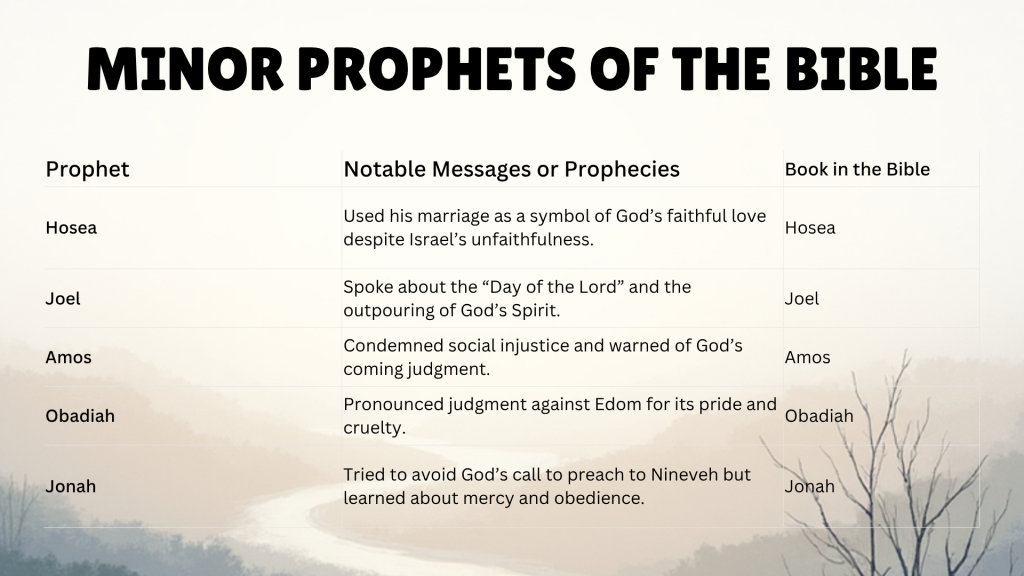Prophets play a central role throughout the Bible. They were the voices God used to guide, warn, and comfort His people. Each prophet had a message shaped by the time they lived in, the struggles of the nation, and God’s plan for the future. Let’s look at who they were, what they said, and why their words still matter.
What is a Prophet?
A prophet is a messenger of God. The word “prophet” comes from the Hebrew word nabi, which means “one who speaks on behalf of another.” In simple terms, prophets were people chosen by God to speak His truth.
They often warned people against sin, gave guidance during crises, and shared visions of the future. But they weren’t just predictors of events. They were teachers, leaders, and sometimes even reformers.
Many prophets faced rejection or persecution. Their messages were not always pleasant, because truth rarely is. Yet, they remained faithful to God’s calling.
Major Prophets of the Bible
The “Major Prophets” are called major not because they were more important, but because their books are longer and cover broader themes. They include Isaiah, Jeremiah, Lamentations (linked to Jeremiah), Ezekiel, and Daniel.
These prophets lived through times of exile, national downfall, and spiritual renewal. Their words shaped the faith of both Jews and Christians for generations.
| Prophet | Notable Messages or Prophecies | Book in the Bible |
|---|---|---|
| Isaiah | Spoke about the coming Messiah, warned Judah of sin, and promised hope through God’s salvation. | Isaiah |
| Jeremiah | Called the people to repent, warned about Jerusalem’s fall, and shared God’s promise of a new covenant. | Jeremiah |
| Lamentations (Jeremiah) | Mourned the destruction of Jerusalem; expressed sorrow and hope in God’s mercy. | Lamentations |
| Ezekiel | Shared vivid visions, spoke of God’s glory, judgment, and the eventual restoration of Israel. | Ezekiel |
| Daniel | Remained faithful in exile; interpreted dreams; revealed God’s control over nations and history. | Daniel |
Each of these prophets brought a different side of God’s message—judgment, mercy, and ultimate hope. Isaiah gave us prophecies about Jesus. Jeremiah showed us God’s heart for repentance. Ezekiel revealed visions that stretched beyond human imagination.
Minor Prophets of the Bible

The “Minor Prophets” wrote shorter books, but their messages were no less powerful. They include twelve prophets, often called The Twelve.
They spoke to both Israel and Judah, warning them against injustice, idolatry, and neglect of God’s law. Some also brought messages of restoration and hope after judgment.
| Prophet | Notable Messages or Prophecies | Book in the Bible |
|---|---|---|
| Hosea | Used his marriage as a symbol of God’s faithful love despite Israel’s unfaithfulness. | Hosea |
| Joel | Spoke about the “Day of the Lord” and the outpouring of God’s Spirit. | Joel |
| Amos | Condemned social injustice and warned of God’s coming judgment. | Amos |
| Obadiah | Pronounced judgment against Edom for its pride and cruelty. | Obadiah |
| Jonah | Tried to avoid God’s call to preach to Nineveh but learned about mercy and obedience. | Jonah |
| Micah | Spoke of judgment and hope, including the prophecy of the Messiah’s birth in Bethlehem. | Micah |
| Nahum | Announced the fall of Nineveh, showing God’s justice against cruelty. | Nahum |
| Habakkuk | Questioned God about evil and injustice; learned to trust His timing. | Habakkuk |
| Zephaniah | Warned of judgment but promised restoration for those who turn to God. | Zephaniah |
| Haggai | Urged the people to rebuild the temple after returning from exile. | Haggai |
| Zechariah | Encouraged the rebuilding of Jerusalem and shared visions pointing to the Messiah. | Zechariah |
| Malachi | Challenged the people to stay faithful and foretold the coming of John the Baptist. | Malachi |
These prophets lived in hard times. Their words often balanced warning with promise. Hosea’s heartbreak showed God’s love in a way no sermon could. Jonah’s story reminded us that God’s mercy reaches even those we might see as enemies.
Other Significant Prophets
Beyond the “Major” and “Minor” Prophets, many others played key roles in the Old Testament story. They might not have written books, but their voices were still vital.
| Prophet | Notable Messages or Prophecies | Book in the Bible |
|---|---|---|
| Moses | Led Israel out of Egypt, received the Ten Commandments, and spoke directly with God. | Exodus, Numbers, Deuteronomy |
| Samuel | Anointed Israel’s first kings, including Saul and David; guided the nation through transition. | 1 Samuel |
| Nathan | Confronted King David about his sin with Bathsheba; spoke God’s promise of an everlasting kingdom. | 2 Samuel |
| Elijah | Faced off against Baal’s prophets, called down fire from heaven, and was taken up in a whirlwind. | 1 Kings, 2 Kings |
| Elisha | Performed many miracles and continued Elijah’s prophetic mission with compassion and power. | 2 Kings |
| Deborah | Judge and prophetess who led Israel to victory; showed courage and faith. | Judges |
| Gad | Advised King David and delivered messages of warning and direction. | 1 Samuel, 2 Samuel |
| Ahijah | Prophesied the division of Israel’s kingdom under Jeroboam. | 1 Kings |
| Micaiah | Spoke truth to power, warning King Ahab of defeat. | 1 Kings |
| Huldah | A prophetess who confirmed God’s law during King Josiah’s reforms. | 2 Kings |
Some prophets worked behind the scenes. Others stood before kings. But all carried the same burden—to speak God’s word faithfully, even when it cost them everything.
The Prophetic Role in the New Testament

Prophecy didn’t end with the Old Testament. In the New Testament, the prophetic voice continued through John the Baptist, Jesus Himself, and later through the apostles and early believers.
John the Baptist prepared the way for Jesus, preaching repentance. Jesus fulfilled the words of many prophets before Him and spoke new truths about the Kingdom of God.
The New Testament also mentions prophets in the early church. They encouraged, corrected, and strengthened believers. People like Agabus in the Book of Acts gave specific prophecies that guided the church during difficult times.
| Prophet | Notable Messages or Prophecies | Book in the Bible |
|---|---|---|
| John the Baptist | Called people to repentance; prepared the way for Jesus. | Gospels (Matthew, Mark, Luke, John) |
| Jesus Christ | Spoke God’s ultimate truth; fulfilled all prophecies; revealed God’s Kingdom. | Gospels |
| Agabus | Predicted a famine and Paul’s arrest in Jerusalem. | Acts |
| Anna (Prophetess) | Recognized Jesus as the Messiah at the temple. | Luke |
The New Testament shows that prophecy was not only about predicting the future. It was about revealing God’s truth for the moment—helping people live faithfully, right where they were.
Purpose of Prophets and Modern Lessons
So, what’s the purpose of prophets? In short, they remind us of God’s voice. Prophets call people back to what’s right, even when it’s unpopular.
Their messages teach us about repentance, justice, mercy, and faithfulness. They show how God cares deeply about both individuals and nations.
Even today, we can learn from their courage. In a world full of noise, prophets remind us that truth often comes quietly—through faith, obedience, and humility.
You might wonder, do prophets still exist today? Many believe the prophetic spirit continues through those who speak truth with boldness and compassion. It’s less about predicting the future and more about calling people to live with purpose and integrity.
In a way, anyone who stands up for truth and justice carries a bit of the prophetic role.
Final Thoughts
From Moses to Malachi, from Isaiah to John the Baptist, every prophet pointed to one thing—God’s desire to guide His people.
Their words are timeless because human nature hasn’t changed much. We still need direction, correction, and hope.
So when you read the prophets, don’t just see them as voices from the past. See them as reminders of what it means to listen, obey, and trust God’s voice—then and now.

Cala Joy is a wellness coach, breathwork facilitator, and passionate explorer of heart-centered living. Her articles focus on emotional healing, energy alignment, and creating a life led by love and intuition.

